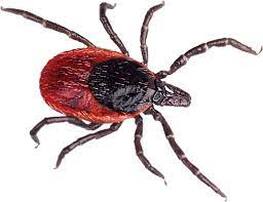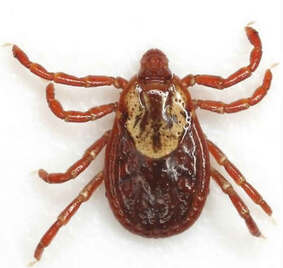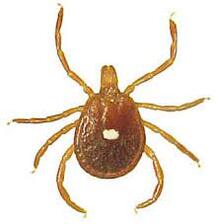Can you believe there are approximately 850 variety of ticks throughout the world, and over 90 throughout the United States.
Ticks are vector pests that may transmit disease to humans.
Common ticks found in NY and CT:
- Blacklegged Ticks (aka Deer Tick) transmit Lyme disease
- American Dog Ticks transmit Rocky Mountain Spotted Fever
- Lone Star Ticks transmit Earlichiosis
Ticks are vector pests that may transmit disease to humans.
Common ticks found in NY and CT:
- Blacklegged Ticks (aka Deer Tick) transmit Lyme disease
- American Dog Ticks transmit Rocky Mountain Spotted Fever
- Lone Star Ticks transmit Earlichiosis
Facts about ticks:
- Ticks are not insects. They are classified as arachnids, related to spiders, scorpions and mites.
- Ticks (real-life vampires) want to suck your blood. Ticks need blood for strength, nourishment, and survival.
- Ticks don't Jump, hop, or fly. Instead they crawl up grasses and brush about knee high to wait for a host to clasp on (animal or human).
- Ticks live up to approximatley 2 years.
- There are 4 stages of a tick (egg, larvae, nymph, and adult)
- Except for the egg stage, all stages of ticks need to feed on blood for survival.
- Ticks inhabit dense, wooded areas. Overgrown shrubs, thick brush, meadows, and places where the ground is covered with leaves. -
- Ticks are not insects. They are classified as arachnids, related to spiders, scorpions and mites.
- Ticks (real-life vampires) want to suck your blood. Ticks need blood for strength, nourishment, and survival.
- Ticks don't Jump, hop, or fly. Instead they crawl up grasses and brush about knee high to wait for a host to clasp on (animal or human).
- Ticks live up to approximatley 2 years.
- There are 4 stages of a tick (egg, larvae, nymph, and adult)
- Except for the egg stage, all stages of ticks need to feed on blood for survival.
- Ticks inhabit dense, wooded areas. Overgrown shrubs, thick brush, meadows, and places where the ground is covered with leaves. -
How to remove a tick:
Removing ticks quickly from the body is important to prevent tick-borne disease infection. The best method to remove a tick is by using tweezers. Grasp the tick by its head or as close possible nearest the skin. Slowly pull the tick until it's fully released. Its recommended to put tick in a zip-lock bag to get tested.
Removing ticks quickly from the body is important to prevent tick-borne disease infection. The best method to remove a tick is by using tweezers. Grasp the tick by its head or as close possible nearest the skin. Slowly pull the tick until it's fully released. Its recommended to put tick in a zip-lock bag to get tested.
How to protect yourselves and your pet:
- When going for walks or hikes, it is highly recommended to to wear long pants and long sleeve shirts.
- When returning, you should inspect your clothes for ticks.
- For some extra protection use tick repellant containing DEET.
- You can use tick collars on your dog when going out for walks.
- You can bathe your dog with flea & tick shampoos.
- When going for walks or hikes, it is highly recommended to to wear long pants and long sleeve shirts.
- When returning, you should inspect your clothes for ticks.
- For some extra protection use tick repellant containing DEET.
- You can use tick collars on your dog when going out for walks.
- You can bathe your dog with flea & tick shampoos.
How to create a Tick-free Yard:
- Piles of leaves - Pick up leaf piles because ticks like to breed there.
- Wooded areas - Spray perimeters with tick killing products like bifenthrin. Creating a perimeter of wood chips is good because ticks do not like crawling over them.
- Wood piles - Ticks like wood piles so try to keep away and off your house, shed, etc.
- Yard maintenance - You should cut your lawn weekly to maintain grass lower. You should cut growing weeds that are next to buildings.
- Piles of leaves - Pick up leaf piles because ticks like to breed there.
- Wooded areas - Spray perimeters with tick killing products like bifenthrin. Creating a perimeter of wood chips is good because ticks do not like crawling over them.
- Wood piles - Ticks like wood piles so try to keep away and off your house, shed, etc.
- Yard maintenance - You should cut your lawn weekly to maintain grass lower. You should cut growing weeds that are next to buildings.
Tick Control Program:
Spraying for ticks is important! We focus on all tick resting areas and we drench those areas with an effective spray solution to keep ticks away for weeks. Our program is designed to give continuous protection. We spray approximately every 3 to 4 weeks and weather permitting, we can start spraying for ticks as early as March. The key to a Tick Control Program is to maintain a layer of protection each month to keep ticks in check and prevent them from invading the protected barrier zone around your property.
Spraying for ticks is important! We focus on all tick resting areas and we drench those areas with an effective spray solution to keep ticks away for weeks. Our program is designed to give continuous protection. We spray approximately every 3 to 4 weeks and weather permitting, we can start spraying for ticks as early as March. The key to a Tick Control Program is to maintain a layer of protection each month to keep ticks in check and prevent them from invading the protected barrier zone around your property.
Tick Programs Offered:
- Natural Organic Cedar Oil Sprays
- Generic Bifenthrin Solution Sprays
- Both are just as effective but generic sprays will have a longer residual.
- Natural Organic Cedar Oil Sprays
- Generic Bifenthrin Solution Sprays
- Both are just as effective but generic sprays will have a longer residual.
Satisfaction Guarantee:
Blue Green Lawn Care stands behind our products and services. If you are concerned about timing of sprays, weather, or something else, please contact us and we will make things right. We want you to be fully satisfied with every visit. Once we hear about your concerns, we will put a corrective action in place. We care what you think and we care about our reputation.
Blue Green Lawn Care stands behind our products and services. If you are concerned about timing of sprays, weather, or something else, please contact us and we will make things right. We want you to be fully satisfied with every visit. Once we hear about your concerns, we will put a corrective action in place. We care what you think and we care about our reputation.




